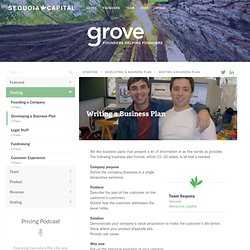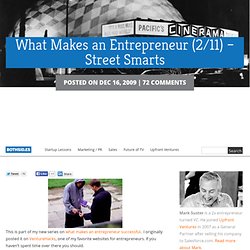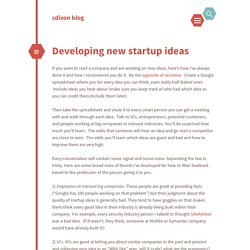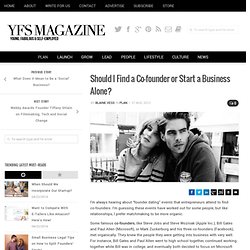

Andrew LeDuc
Startup business. Business. Writing a Business Plan : Startup Ideas : Sequoia Capital : US. Writing a Business Plan At Sequoia we like business plans that present a lot of information in as few words as possible.

The following business plan format, within 15–20 slides, is all that’s needed... read We like business plans that present a lot of information in as few words as possible. The following business plan format, within 15–20 slides, is all that’s needed. Company purpose Define the company/business in a single declarative sentence. ProblemDescribe the pain of the customer (or the customer’s customer). SolutionDemonstrate your company’s value proposition to make the customer’s life better. Why now Set-up the historical evolution of your category. Market sizeIdentify/profile the customer you cater to. Competition List competitors List competitive advantages Product Product line-up (form factor, functionality, features, architecture, intellectual property). TeamFounders & Management Board of Directors/Board of Advisors See also Elements of Enduring Companies. Elements of a Strong Business Plan.
Napkin Think Force yourself to summarize your idea on the back of a cocktail napkin. Don’t submit your plan until you have this level of clarity. Team Who will occupy the leadership roles in your company, why are they the best players for the task at hand, and how will they go about building an agile, customer-focused culture? If you believe that an advisory board or governing board will help you grow your dream team, we may be able to help you find the right people.
Pain What problem are you trying to solve? Solution Why is your solution superior to competitors, who are the key competitors, what differentiator will propel your solution to break through and achieve broad adoption? Customer Acquisition Too many early stage businesses fail to fully explain their methods and costs of acquiring customers. What Makes an Entrepreneur (2/10) – Street Smarts. I started the series talking about what I consider the most important attribute: Tenacity. 2.

Street Smarts - OK, so you’re a tenacious person – you never give up. Well obviously that’s meaningless if your startup idea sucks. I don’t think it takes book smart people to build great companies – sometimes it’s a hindrance. But you do have to be a smart person and I personally prefer street smarts. Because they’re street smart, most great entrepreneurs tend to prefer getting out and talking with real customers rather than sitting in a cubicle all day doing beautiful PowerPoint slides.
I often tell people that I’m looking for people that weren’t born with a silver spoon in their mouths. If I were writing about the most important attributes of a VC (hmmm) one of the things that would make my list is “ability to spot patterns.” So I had written this whole series the week of Thanksgiving, but virtually every day I wake up and see examples. I loved that story because it’s so true. Developing new startup ideas cdixon.org – chris dixon's blog. If you want to start a company and are working on new ideas, here’s how I’ve always done it and how I recommend you do it.

Be the opposite of secretive. Create a Google spreadsheet where you list every idea you can think, even really half-baked ones. Include ideas you hear about (make sure you keep track of who had which idea so you can credit them/include them later). Then take the spreadsheet and show it to every smart person you can get a meeting with and walk through each idea. Talk to VCs, entrepreneurs, potential customers, and people working at big companies in relevant industries. Every conversation will contain some signal and some noise. 1) Employees at relevant big companies. 2) VCs. 3) Potential customers. 4) Entrepreneurs. Even though I have no intention of starting a new company for a long time (if ever), I still keep my idea spreadsheet and update it periodically. . * Thanks to James Cham for inspiring & contributing ideas to this post! Wufoo · Online Form Builder!
Should I Find a Co-founder or Start a Business Alone? Photo: Pepe I’m always hearing about “founder dating” events that entrepreneurs attend to find co-founders.

I’m guessing these events have worked out for some people, but like relationships, I prefer matchmaking to be more organic. Some famous co-founders, like Steve Jobs and Steve Wozniak (Apple Inc.), Bill Gates and Paul Allen (Microsoft), or Mark Zuckerburg and his three co-founders (Facebook), met organically. They knew the people they were getting into business with very well. For instance, Bill Gates and Paul Allen went to high school together, continued working together while Bill was in college, and eventually both decided to focus on Microsoft full-time. On a similar note, there are many non-technical entrepreneurs in the tech space who are looking for technical co-founders.
I thought about trying to raise money, but I feel very fortunate that someone advised me to learn how to program for the web instead of raising money. You’re the sole decision maker.